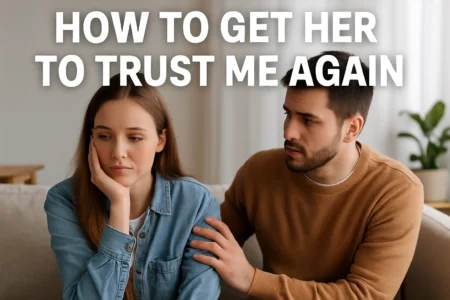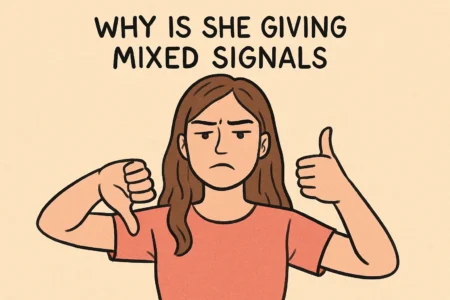It happens in drips, then all at once. The “good morning, beautiful” texts just… stop. Date night, once the anchor of your week, now gets a constant “maybe next week.” Suddenly, you’re the one starting every text, making every plan, pushing every single interaction forward. It’s a quiet, creeping cold that leaves you staring at your phone, a pit forming in your stomach, asking yourself one question: What did I do wrong? When he stops making an effort all of a sudden, it’s more than just disappointing.
It’s destabilizing. Your whole world feels a little tilted, and you start questioning the relationship, your connection, and even your own worth.
Trust me, I’ve been there. I still remember the hollow ache in my chest when a man I was crazy about went from pursuing me like I was the only woman on earth to treating me like a comfortable old armchair. The change was whiplash-inducing and it hurt. Badly. You feel invisible. Confused. And more than anything, you feel this desperate, primal urge to just fix it—to grab him by the shoulders and demand, “What changed?”
But hold on. Before you hit the panic button, just breathe. This sudden shift is an incredibly common dynamic in relationships. How you choose to handle it right now is what matters. This isn’t about playing games or trying to trick him into paying attention again. It’s about getting smart—understanding the real reasons he might be pulling back, learning how to talk about it without starting a fight, and, most importantly, taking your power back.
More in Relationship Health Category
Key Takeaways
- Pause Before You Panic: A sudden drop in his effort is a signal, not a verdict. Your first move should be to observe and understand, not to react out of fear or launch accusations.
- It’s Probably Not About You: More often than not, his withdrawal is tied to outside stress—work, family problems, or his own mental health. Many men process stress by pulling inward.
- Your Reaction Shapes Everything: How you respond will set the tone for what comes next. Pushing, demanding, or pleading will likely make him retreat further. A calm, confident vibe works wonders.
- Turn the Focus Back to You: This is crucial. Pour that energy back into your own life. Your hobbies, your friends, your goals. It not only makes you feel a hell of a lot better, but it also resets the balance in the relationship.
- Talk, But Time It Right: There’s an art to starting this conversation. Using “I feel” statements during a calm moment is the key to avoiding defensiveness.
- Remember Your Worth: At the end of the day, you deserve a partner who puts in the effort. Knowing when to work on things versus when to walk away is the ultimate act of self-respect.
Why Does It Hurt So Much When He Pulls Away?
Let’s not downplay this. The pain is real. It’s a sharp, personal kind of sting, one that feels like a total rejection of who you are. One minute, you’re the center of his world; the next, you’re an afterthought. That emotional whiplash is a direct trigger for our deepest insecurities. Our brains are hardwired for connection. When that bond is suddenly at risk, every internal alarm bell starts screaming.
It isn’t just about missing the cute texts or the fancy dates. It’s about what his silence means. We read it as a loss of love. A drop in attraction. A sign that we just don’t matter anymore. That feeling can swallow you whole, sending you down a dark spiral of replaying every single interaction, hunting for the exact moment you messed up. Please, give yourself some grace. This pain is valid. You’re not being “crazy” or over-sensitive. You’re human. And your feelings are a completely normal response to your emotional safety being threatened.
But First, Are You Sure He’s Stopped Trying?
Before we declare a state of emergency, let’s get some perspective. What can feel like a full stop is sometimes just a change in speed. Relationships grow and change. That first, breathless, high-intensity phase can’t last forever. It’s just not built to. The real question you need to ask is this: has he settled into a comfortable rhythm, or has he completely checked out?
Could It Be a Shift, Not a Stop?
Think back to the beginning. Remember talking on the phone until 3 a.m.? The endless compliments? That feeling that you two were in your own little bubble. That’s the honeymoon phase. It’s a magical, intoxicating rush fueled by hormones and the thrill of the new. It’s amazing. But it’s not sustainable.
As a relationship finds its footing, effort starts to look different. The frantic, all-day texting might be replaced by a peaceful silence as you both read on the couch together. Big, romantic gestures might give way to the quiet intimacy of him making your coffee just the way you like it every morning. That’s not him stopping his effort; it’s the effort evolving into something more durable. It’s a sign of security, not a sign of neglect. The energy shifts from winning you over to building a life with you.
How Can I Tell the Difference Between Comfort and Complacency?
This is the big one. Comfort feels like a warm, safe hug. Complacency feels like being ignored. They can look similar from a distance, so you have to pay attention to the details.
Comfort looks like:
- He might not text you all day from work, but when you’re together, he’s with you—present, engaged, and listening.
- The elaborate date nights might fade, but he starts weaving you into the fabric of his real life—running errands, seeing his friends, making dinner together.
- He shows he cares in small, practical ways. He fixes that leaky faucet, makes sure your car has gas, or just quietly listens when you vent about a rough day.
- Physical affection is still there. Maybe it’s a quick kiss on the forehead or him reaching for your hand. The connection still hums between you.
Complacency looks like:
- He’s not just less talkative; he’s disengaged. He’s scrolling through his phone while you’re talking or giving you one-word answers.
- “Date night” is now just him playing video games in one room while you watch TV in another. There’s no real quality time.
- He’s stopped considering your needs. He makes plans without checking with you or just assumes you’ll go along with whatever he wants.
- Affection and intimacy have dried up or feel completely one-sided. It feels less like a partnership and more like you’re just roommates.
If you’re seeing the signs of comfort, you might just need to adjust your own expectations. But if it’s looking a lot more like complacency, it’s time to figure out what’s really going on.
What Are the Real Reasons He Might Be Pulling Back?
When a guy’s effort drops off a cliff, our minds immediately turn on us. We think, I’m not exciting enough. I’m not pretty enough. I shouldn’t have said that thing last week. While a little self-reflection is always a good idea, making it all about you is usually the wrong move. Nine times out of ten, his behavior has everything to do with what’s going on in his world, not yours.
Is It About Me, or Is It About Him?
I had to learn this lesson the hard way. A friend of mine, Sarah, was dating this amazing guy. He was so attentive for the first six months, and then, poof. He went quiet and distant. Sarah, of course, went into a total tailspin, convinced she’d pushed him away. She was literally about to break up with him when she finally just sat him down to talk. The truth? His dad had just gotten a terrifying health diagnosis, and he was completely overwhelmed with fear. He wasn’t pulling away from her. He was retreating into himself to deal with it.
Most guys are taught from day one to bottle things up and “be a man.” So when they’re overwhelmed, stressed, or scared, their first instinct isn’t to reach out for a hug and a chat. It’s to pull back, go into their “cave,” and try to wrestle the problem into submission on their own. His silence isn’t a verdict on you. It’s a symptom of his own battle.
Could He Be Stressed or Overwhelmed?
Take a minute and really think about his life right now. Is he under a mountain of pressure at work? Worried about money? Dealing with some heavy family drama? Stress is the ultimate killer of romance and effort. When a man’s mind is completely wrapped up in a problem, he has zero emotional or mental energy left for anything else.
That doesn’t give him a free pass to neglect you, but it’s critical context. The problem-solving part of his brain is working overtime, which means the nurturing, connection-focused part has been put on the back burner. He’s so focused on not failing in one area of his life that he doesn’t even see he’s starting to fail in another—your relationship.
Is He Feeling Unsure About the Relationship?
Then again, sometimes it is about the two of you. He might be having genuine doubts. Maybe the initial rush has faded, and he’s wondering if you’re truly compatible for the long haul. Perhaps there was a fight that never really got resolved, or a core difference in your values is starting to show.
If that’s the case, his withdrawal is a sign of his own confusion. He might be pulling back to get some air, to try and hear his own thoughts without your influence. It’s a painful thought, I know, but you can’t ignore it. The good news? Doubt isn’t a final decision. It’s just a question. And it’s a question you can explore together if you’re both willing to be honest.
Have I Changed in a Way That’s Pushing Him Away?
This is the part that requires some tough, honest self-reflection. Have you, maybe, become a little more critical lately? More demanding? Has your own stress made you less affectionate or more negative to be around? Sometimes, we accidentally help create the exact dynamic we can’t stand. If the energy you’re bringing has turned sour, he might be pulling away simply because it’s a reaction to you.
Think about your recent interactions. Have you been appreciative of him, or have you been keeping a running tally of everything he’s doing wrong? Have you been his soft place to land, or another source of stress? This isn’t about blaming yourself. It’s about owning your side of the street. A relationship is a dynamic system; when one person shifts, the other one does, too.
How Do I Figure Out What’s Actually Going On?
Alright, you’ve done your homework. You’ve observed, you’ve considered the possibilities. Now for the hard part: talking about it. How you kick off this conversation is everything. It can be the difference between a real, honest talk that brings you closer and a huge fight that pushes him even further into his shell.
Why Is Just “Asking Him What’s Wrong” a Bad Idea?
It seems so simple, right? Just ask, “What’s wrong?” or “Are you okay?” The problem is, to a lot of men, that question sounds like an accusation. It instantly puts them on the defensive, like they’re being interrogated. It backs them into a corner where they either have to lie (“Nothing, I’m just tired”) or get dragged into a heavy emotional talk they’re not ready for.
When a guy is holed up in his mental “cave,” that question feels like you’re barging in and flipping on all the lights. His immediate reflex is to shut down even harder. That question comes from your anxiety, not a place of connection, and he can feel it. It makes the situation feel like a five-alarm fire that needs to be put out right now, which is completely overwhelming.
How Can I Start a Conversation That Actually Works?
The right way to start is with softness. With vulnerability. It’s an invitation, not a confrontation.
I learned this from experience. I was dating a guy, Mark, who was super chatty at first. Then, the slow fade began. My anxiety went through the roof. My first instinct was to attack him with questions: “Why are you being so weird? Did I do something? Don’t you like me anymore?” It was a total disaster. Every question was another brick he used to build his wall higher.
Finally, after a much-needed vent session with a friend, I tried something new. I waited for a calm moment when we were just chilling on the couch. I took a huge breath to ground myself and said, “Hey… I’ve been feeling a little disconnected from you lately, and I really miss you. Just wanted to see how you’re doing.”
The shift was instant. His shoulders literally dropped. He didn’t spill his guts right then and there, but he admitted he’d been slammed at work. The door creaked open. The magic was that I made it about my feelings (“I feel disconnected”) instead of his actions (“You are being distant”). I expressed a desire (“I miss you”) instead of a complaint. This approach, as championed by relationship experts at the Gottman Institute, is about turning toward your partner with a bid for connection, not turning away with a criticism. It’s an invitation to solve a problem together.
What Are My Next Steps? (The Action Plan)
Whether you’ve had the talk or you’re giving it a beat, what you do next is so important. This is your chance to either spiral into neediness or step into your power and create real, positive change.
Should I Give Him Space or Pull Him Closer?
The frustrating answer is… a little of both. It’s a delicate dance. If you get the sense he’s drowning in outside stress, giving him some breathing room is the most loving thing you can do. It shows him you trust him to handle his business and that your security doesn’t hinge on his constant attention. Let him know you’re there if he needs you, and then—this is the important part—go live your own awesome life. Removing that pressure often makes him feel safe enough to come back to you.
But “giving space” doesn’t mean hitting him with the cold shoulder. You can still maintain the connection in gentle, low-stakes ways. Send a text that says, “Thinking of you, hope your day is going okay,” with zero expectation of a big reply. Offer a hug or a quick back rub without launching into a big talk. These are small deposits in the emotional bank account that keep you connected without making a withdrawal from his depleted energy reserves.
How Can I Focus on Myself During This Time?
When his effort fades, it’s so easy to make him the center of your universe. You become a detective, analyzing his every move, checking your phone every two seconds. You basically put your entire life on pause, just waiting for him to come around. This is the worst thing you can possibly do. It torpedoes your confidence, drains your spirit, and frankly, it makes you less attractive.
Now is the time to take all that anxious, obsessive energy and pour it right back into yourself. Remember who you were before him. This isn’t some trick to “make him miss you”—though that’s often a happy side effect. This is for you. It’s about reminding yourself that you are a whole, amazing person with or without his constant approval.
- Call your friends. Get a girls’ night on the calendar, stat. Go laugh until you cry.
- Get lost in a hobby. That painting class you wanted to take? Sign up. That stack of books on your nightstand? Crack one open.
- Move your body. Go for a run. Take a hike. Blast your favorite music and have a solo dance party in your kitchen. Exercise is the best cure for anxiety.
- Crush a personal goal. That project at work you’ve been putting off? That skill you wanted to learn? Dive in and do something that makes you feel proud of yourself.
When your own life is full and vibrant, you bring a completely different, magnetic energy to the relationship. You become a warm fire he wants to be near, not a vacuum of need.
What If My Needs Still Aren’t Being Met?
Let’s be clear: focusing on yourself doesn’t mean you turn into a doormat. You have needs, and they matter. If you’ve given it time, tried the gentle conversation, and you still feel like you’re being neglected, it’s time for a different kind of talk.
This is where you calmly, clearly, and lovingly set a boundary. It’s not a threat or an ultimatum. It’s just a statement of what you need to feel happy and safe in a relationship. You could say something like, “I know you’ve been under a lot of stress, and I really want to support you through it. For me to feel connected and happy in our relationship, I need regular quality time together. Can we commit to one date night a week, even if it’s just cooking at home with our phones off?”
It’s fair. It’s specific. It’s solution-oriented. It gives him a clear roadmap to meet your needs. His response to that request will tell you everything you need to know.
When is it Time to Worry That He Stops Making an Effort for Good?
There’s a point where you have to be honest with yourself. Are you in a rough patch, or are you at a dead end? Giving your partner grace is one thing; being the only person rowing the boat is another. Knowing the red flags that signal a deeper problem isn’t pessimistic—it’s an act of self-preservation.
What are the Red Flags I Can’t Ignore?
Some things go way beyond a simple lack of effort. They’re signs of disrespect, deep-seated disinterest, or major issues you can’t fix for him.
- Consistent Disrespect: This isn’t just a bad mood. It’s contempt. It’s him making sarcastic, cutting remarks, calling you names, or constantly making you feel small.
- Stonewalling: He doesn’t just need space; he completely refuses to engage in any conversation about your relationship. It’s a total shutdown.
- Gaslighting: He actively tries to make you think you’re the crazy one. He’ll say things like, “I haven’t changed at all, you’re just being paranoid,” when you both know his behavior has done a 180.
- Secrecy and Deception: He’s suddenly shady with his phone, vague about where he’s been, or your gut is just screaming that something is off.
- Zero Accountability: Nothing is ever his fault. He finds a way to blame you for his bad moods, his distance, and the state of the relationship.
If you’re seeing these patterns, the problem is so much bigger than him being “stressed.” This is toxic territory, and you need to prioritize your own emotional safety above all else.
How Do I Know if the Relationship is Worth Saving?
If the major red flags aren’t there but the effort is still gone, you have to ask yourself some hard questions. Think about the relationship as a whole. Is the foundation solid? Do you share the same core values? When things were good, were they really good? Can you still see a future with him? And—this is the big one—do you think he still sees one with you?
A relationship worth saving is built on a foundation of mutual respect. It has a history of good times that far outweigh the bad. And it has two people who are fundamentally willing to do the work. If that foundation is cracked, or if you’re the only one showing up with a toolbox, you might be trying to save a building that’s already been condemned.
What Does Walking Away Actually Look Like?
Leaving someone you love is one of the most painful things a person can do. It feels like a monumental failure. But sometimes, walking away is the biggest success of all—it’s the success of finally choosing yourself.
It means accepting a hard truth: you can’t make someone love you, respect you, or try for you. It means allowing yourself to grieve the future you thought you’d have so you can start building a new one. It’s a gut-wrenching process, but I promise you, on the other side of that pain is the quiet peace of knowing you honored your own worth. You refused to settle for a love that required you to shrink.
How Can We Rebuild the Connection and Bring the Effort Back?
If you’ve both decided that this relationship is worth fighting for, the real work begins. This isn’t about trying to rewind and get back to the honeymoon phase. It’s about building something stronger, something that can actually handle the pressures of real life.
Can We Really Get That Spark Back?
Yes, absolutely. But it doesn’t just reappear. You create it. Intentionally. The “spark” isn’t some kind of magic; it’s just the byproduct of novelty, affection, and sharing positive experiences. Start scheduling fun, low-pressure things to do together. Go explore a new part of town, try cooking a complicated recipe, play a stupid board game. The goal is to create new, happy memories to overwrite the recent feelings of distance. Laughter is the best glue.
Why is Showing Appreciation So Important?
This is huge. When he starts to make an effort again—even in the smallest ways—you have to notice it and name it. Positive reinforcement is the most powerful tool in the world. If he plans a simple date, tell him, “Thank you so much for planning this, I had the best time with you tonight.” If he opens up about what’s been stressing him out, thank him for trusting you with it.
This isn’t about coddling him. It’s about showing him that his efforts are seen and that they land with you. When people feel appreciated, they want to do more of the things that earned them that appreciation. It creates an upward spiral. Instead of pointing out what he’s doing wrong, you’re highlighting everything he’s doing right. That alone can change the entire emotional climate of your relationship.
What Role Does Physical Intimacy Play?
Touch is a basic human need, and it’s the lifeblood of a romantic partnership. When emotional distance creeps in, physical distance is never far behind. Re-establishing that physical connection can be a shortcut to rebuilding emotional intimacy.
Start small. Hold his hand while you’re watching TV. Give him a hug that lasts a few seconds longer than usual. These tiny points of contact can re-establish a feeling of closeness and safety. When you’re both ready, rediscovering sex can be a profound way to reconnect, releasing all those good bonding hormones and reminding you both of the powerful attraction that brought you together in the first place.
The Bottom Line
When the man you love stops trying, it can feel like the world is ending. It’s terrifying. But I want you to remember this: you are not powerless here. You can’t control him—his feelings, his actions, his stress—but you are the one and only boss of you. You get to choose your response. You can choose to spiral into panic,n choose to respond a with ca withlmfident, and compassionate strength.
Address the situation with grace, focus on your own happiness, and communicate your needs with clarity. Whether he steps up and meets you there or not, you will have handled a difficult situation with dignity and self-respect. And in the end, that is the only effort you can truly control.
FAQ – Stops Making an Effort

Why does it hurt so much when he pulls away in the relationship?
The pain is a real and personal response to feeling rejected or less valued, triggering deep insecurities and perceiving a loss of love and attraction, which can feel overwhelming and lead to replaying past interactions.
How can I tell if he has really stopped trying or if it’s just a shift in his effort?
Observe if he’s settled into a comfortable rhythm, like small practical gestures and consistent presence, versus complete disengagement or neglect, which indicates a more serious problem.
What are the key signs of comfort versus complacency in a relationship?
Comfort shows engagement, presence, and small practical acts of care, whereas complacency involves disengagement, one-sided affection, and neglect of your needs.
How should I approach a conversation with him about his withdrawal?
Start with a calm, vulnerable, and non-accusatory tone, expressing your feelings and needs using ‘I feel’ statements, focusing on shared solutions rather than blame.
What are the red flags that indicate a relationship might be toxic or beyond saving?
Red flags include consistent disrespect, stonewalling, gaslighting, secrecy, deception, and zero accountability, which suggest deep issues that threaten your emotional safety.





